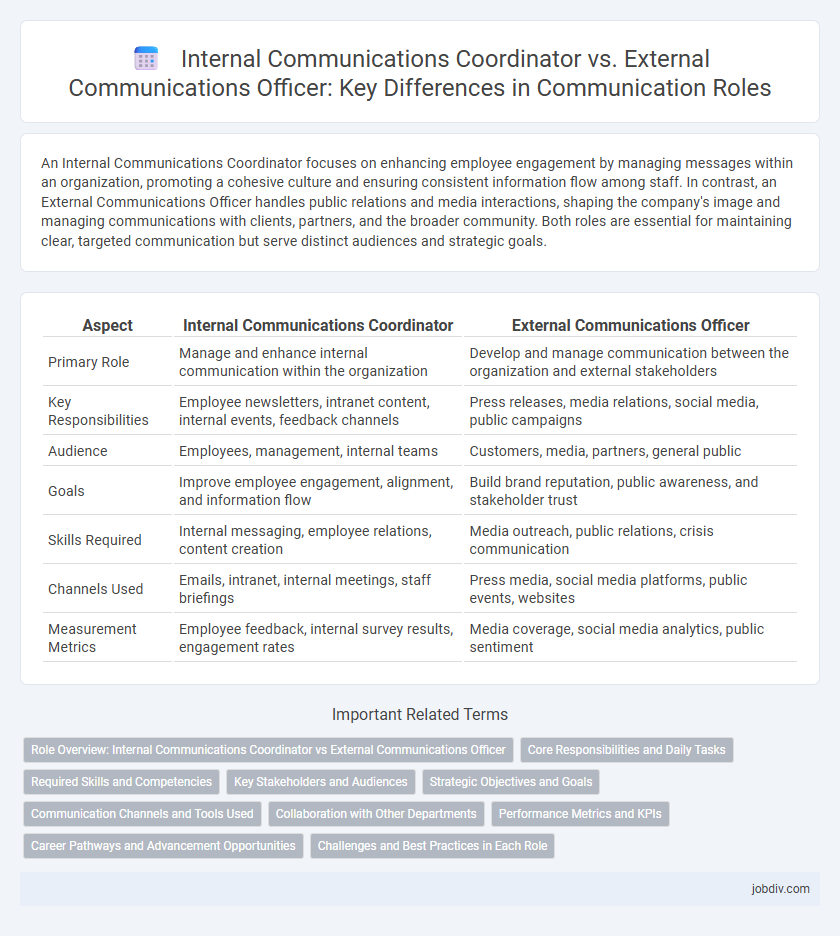An Internal Communications Coordinator focuses on enhancing employee engagement by managing messages within an organization, promoting a cohesive culture and ensuring consistent information flow among staff. In contrast, an External Communications Officer handles public relations and media interactions, shaping the company's image and managing communications with clients, partners, and the broader community. Both roles are essential for maintaining clear, targeted communication but serve distinct audiences and strategic goals.
Table of Comparison
| Aspect | Internal Communications Coordinator | External Communications Officer |
|---|---|---|
| Primary Role | Manage and enhance internal communication within the organization | Develop and manage communication between the organization and external stakeholders |
| Key Responsibilities | Employee newsletters, intranet content, internal events, feedback channels | Press releases, media relations, social media, public campaigns |
| Audience | Employees, management, internal teams | Customers, media, partners, general public |
| Goals | Improve employee engagement, alignment, and information flow | Build brand reputation, public awareness, and stakeholder trust |
| Skills Required | Internal messaging, employee relations, content creation | Media outreach, public relations, crisis communication |
| Channels Used | Emails, intranet, internal meetings, staff briefings | Press media, social media platforms, public events, websites |
| Measurement Metrics | Employee feedback, internal survey results, engagement rates | Media coverage, social media analytics, public sentiment |
Role Overview: Internal Communications Coordinator vs External Communications Officer
An Internal Communications Coordinator manages the flow of information within an organization, ensuring employees are informed and engaged through newsletters, intranet updates, and internal events. An External Communications Officer focuses on shaping the company's public image by handling media relations, press releases, and social media content aimed at clients, stakeholders, and the broader community. Both roles require strong communication skills but differ in their target audiences and communication channels.
Core Responsibilities and Daily Tasks
An Internal Communications Coordinator manages employee engagement, corporate messaging, and internal campaigns to ensure clear and consistent communication within the organization. An External Communications Officer handles public relations, media outreach, and brand reputation management to maintain the company's external image. Daily tasks for the coordinator include drafting newsletters, organizing town halls, and facilitating intranet updates, while the officer focuses on press releases, media inquiries, and social media content.
Required Skills and Competencies
Internal Communications Coordinators excel in employee engagement, conflict resolution, and content creation with strong skills in organizational psychology, intranet management, and cross-departmental collaboration. External Communications Officers require expertise in media relations, public relations strategy, and brand messaging, emphasizing proficiency in crisis communication, digital marketing tools, and stakeholder management. Both roles demand excellent written and verbal communication skills, adaptability, and the ability to analyze audience needs to tailor effective messaging.
Key Stakeholders and Audiences
Internal Communications Coordinators primarily engage with employees, management teams, and internal departments to ensure clear, consistent messaging within an organization, fostering a unified corporate culture. External Communications Officers focus on stakeholders outside the organization, including customers, media, investors, and the general public, aiming to shape the company's public image and manage external relationships. Both roles require nuanced understanding of their respective audiences to effectively tailor communication strategies that align with organizational goals.
Strategic Objectives and Goals
Internal Communications Coordinators drive employee engagement by aligning messaging with organizational culture and strategic objectives, fostering collaboration and information flow within the company. External Communications Officers focus on shaping public perception and brand reputation through targeted campaigns and media relations, advancing market presence and stakeholder trust. Both roles coordinate efforts to support overarching business goals but prioritize distinct audiences and communication channels to achieve measurable outcomes.
Communication Channels and Tools Used
Internal Communications Coordinators primarily utilize intranet platforms, internal newsletters, and collaboration tools like Microsoft Teams or Slack to facilitate seamless information flow within organizations. External Communications Officers focus on public-facing channels such as social media platforms, press releases, company websites, and email marketing tools to engage external audiences. Both roles leverage analytics software to measure communication effectiveness, but their channel selection aligns with targeting internal staff versus external stakeholders.
Collaboration with Other Departments
Internal Communications Coordinators facilitate seamless collaboration by ensuring timely information flow between departments, enhancing employee engagement and alignment with organizational goals. External Communications Officers coordinate with marketing, sales, and public relations teams to maintain consistent brand messaging and manage stakeholder relationships effectively. Both roles require strong interpersonal skills to bridge gaps and promote unified communication strategies across internal and external channels.
Performance Metrics and KPIs
Internal Communications Coordinators are evaluated primarily on employee engagement scores, message reach within the organization, and the effectiveness of communication campaigns measured by feedback loops and survey results. External Communications Officers focus on media coverage volume, public sentiment analysis, social media engagement rates, and lead generation metrics tied to brand awareness. Both roles leverage communication analytics software and KPI dashboards to optimize strategy and demonstrate impact on organizational objectives.
Career Pathways and Advancement Opportunities
Internal Communications Coordinators typically advance by gaining expertise in employee engagement, corporate culture, and change management, often moving into roles like Internal Communications Manager or Organizational Development Specialist. External Communications Officers develop skills in public relations, media outreach, and brand management, which can lead to careers as Public Relations Managers or Corporate Communications Directors. Both pathways require strong strategic communication abilities, with advancement opportunities linked to industry experience and proficiency in digital communication tools.
Challenges and Best Practices in Each Role
Internal Communications Coordinators face challenges in fostering employee engagement and ensuring message consistency across diverse departments, requiring best practices such as tailored communication strategies and regular feedback loops. External Communications Officers must navigate media relations, brand reputation, and crisis management, emphasizing proactive storytelling and transparent stakeholder interactions as key best practices. Both roles demand strong strategic planning, adaptability, and collaboration skills to effectively manage the unique communication complexities within and outside the organization.
Internal Communications Coordinator vs External Communications Officer Infographic

 jobdiv.com
jobdiv.com